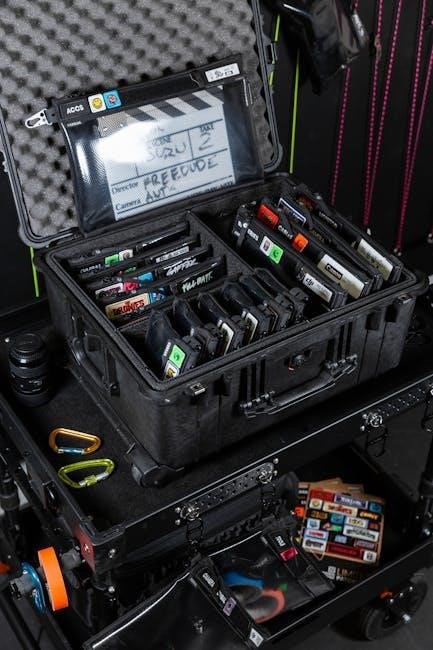Federal Buyer’s Guide Holder Kits are essential for vehicle sales, ensuring compliance with FTC regulations by displaying required information prominently on used cars, protecting both dealers and consumers.
1.1 Overview of the Federal Buyer’s Guide
The Federal Buyer’s Guide is a mandatory disclosure document for used vehicle sales, outlining key information like vehicle history, warranty details, and seller responsibilities. It ensures transparency and compliance with FTC regulations, protecting consumers from deceptive practices. Dealers must display it prominently on every vehicle offered for sale, ensuring buyers have essential details to make informed decisions.
1.2 Importance of Holder Kits in Vehicle Sales
Holder kits are crucial for securely displaying the Federal Buyer’s Guide on vehicles, ensuring compliance with FTC regulations. They protect dealers from legal issues by maintaining the guide’s visibility and integrity. Durable holders prevent tampering or weather damage, ensuring buyers can easily access essential information. This promotes transparency, fairness, and trust in the vehicle sales process, benefiting both dealers and consumers alike.

Key Components of the Buyer’s Guide
The Buyer’s Guide includes a standardized form with essential disclosures, ensuring transparency and compliance with federal regulations, and protecting both dealers and consumers in vehicle transactions;
2.1 The Buyer’s Guide Form
The Buyer’s Guide form is a standardized document required by the FTC, detailing essential information about the vehicle, including make, model, year, mileage, and any known defects or issues. It also outlines the terms of sale, such as whether the vehicle is sold “as is” or with a warranty, and provides space for dealer information and consumer acknowledgment. This form ensures transparency and legal compliance, protecting both buyers and sellers in the transaction process.
2.2 Required Disclosures and Information
The Buyer’s Guide must include specific disclosures, such as the vehicle’s make, model, year, and mileage, as well as any known defects or major repairs. It must also indicate whether the vehicle is sold “as is” or with a warranty, and provide the seller’s contact information. Additionally, it should outline the terms of sale and any implied warranties, ensuring transparency for both buyers and sellers.
Design and Features of Holder Kits
Federal Buyer’s Guide Holder Kits are designed to securely display required disclosures, featuring clear pockets for visibility, durable materials, and easy-installation mechanisms to ensure compliance convenience.
3.1 Standardized Holder Designs
Federal Buyer’s Guide Holder Kits feature standardized designs to ensure compliance with FTC regulations. Clear pockets provide visibility for required disclosures, while durable materials withstand outdoor conditions. The holders are designed for easy installation on vehicle windows or doors, ensuring the Buyer’s Guide remains securely displayed. This standardized approach guarantees consistency across dealerships, meeting federal and state requirements effectively.
3.2 Materials and Durability
Federal Buyer’s Guide Holder Kits are crafted with high-quality, weather-resistant materials to ensure longevity. Durable plastics and UV-resistant coatings protect the Buyer’s Guide from fading and damage. This construction withstands various environmental conditions, maintaining the guide’s readability and compliance. The robust design ensures the holder remains securely attached to the vehicle, even in harsh weather, providing reliable performance for dealerships nationwide.
Legal Requirements for Displaying the Buyer’s Guide
The FTC mandates that dealers prominently display the Buyer’s Guide on every used vehicle, detailing essential information to ensure transparency and protect consumers from deceptive practices.
4.1 FTC Regulations and Compliance
The FTC requires dealers to display the Buyer’s Guide on used vehicles, ensuring transparency. It must include accurate information, such as vehicle history, warranty details, and seller disclosures. Compliance is critical to avoid penalties and legal issues. Proper use of holder kits ensures adherence to these regulations, protecting both dealers and consumers effectively. Always follow FTC guidelines rigorously.
4.2 Penalties for Non-Compliance
Failure to comply with FTC regulations regarding the Buyer’s Guide can result in significant penalties. Dealers may face fines, legal actions, and damage to their reputation. Non-compliance can lead to civil penalties, including substantial monetary fines per violation. Ensuring proper display and accurate information is crucial to avoid these consequences and maintain legal standing in vehicle sales operations.

How to Use the Holder Kits
Holder kits simplify displaying the Buyer’s Guide on vehicles. Attach securely, ensure visibility, and follow FTC guidelines for proper use and compliance in car sales.
5.1 Step-by-Step Installation Guide
Begin by cleaning the vehicle surface where the holder will be placed; Peel the adhesive backing and align the holder with the car’s window or door. Press firmly to secure it. Ensure the Buyer’s Guide is visible and properly inserted into the holder. Double-check the placement for compliance and adjust if necessary for optimal visibility to potential buyers.
5.2 Best Practices for Dealers
Dealers should ensure Buyer’s Guides are correctly displayed on all vehicles, updated with accurate information, and easily visible to customers. Regular audits can help maintain compliance, while staff training ensures everyone understands their role in proper usage. Durable holders and clear placement enhance professionalism, building trust with buyers and safeguarding against potential legal issues.
Benefits for Dealers and Consumers
Federal Buyer’s Guide holder kits ensure dealers comply with FTC regulations, protecting them from penalties and offering consumers clear, transparent vehicle information, fostering trust and informed decisions.
6.1 Transparency in Vehicle Sales
Transparency in vehicle sales is enhanced through the Federal Buyer’s Guide, which requires dealers to disclose essential information about the car’s condition, warranty, and return policies. This ensures consumers are fully informed, fostering trust and reducing potential disputes. Dealers benefit from clear communication, which aligns with FTC regulations and promotes a fair, honest transaction process for both parties involved in the sale.
6.2 Protection for Both Parties
The Buyer’s Guide provides legal protection for both dealers and consumers by documenting vehicle details and seller warranties. This ensures dealers are not held liable for undisclosed issues, while consumers receive clear information about their purchase, reducing misunderstandings and potential legal disputes. Compliance with federal regulations ensures a balanced and secure transaction process for all involved parties in the vehicle sale.

Common Mistakes to Avoid
Dealers often overlook proper placement or fail to update information, leading to non-compliance. Ensuring correct display and timely updates is crucial for avoiding legal issues and penalties.
7.1 Improper Display of the Buyer’s Guide
Improper display includes placing the Buyer’s Guide in hard-to-see locations or failing to secure it properly. Dealers must ensure the guide is prominently visible and readable, as required by FTC regulations. Neglecting this can result in legal penalties and non-compliance issues. Always verify placement and visibility to avoid violations and maintain transparency in vehicle sales processes.
7.2 Failure to Update Information
Failure to update information on the Buyer’s Guide can lead to inaccuracies and mislead consumers, violating FTC regulations. Dealers must regularly review and update the details to ensure compliance and avoid penalties. Outdated information can result in legal consequences and harm trust between dealers and buyers. Keeping the guide current is essential for transparency, legal adherence, and protecting both dealers and consumers effectively.

State-Specific Requirements
State-specific requirements exist alongside federal regulations, with some states adding extra disclosure requirements or display format rules. Compliance with both is crucial to avoid penalties and legal issues.
8.1 Variations in State Laws
State laws often add specific requirements to federal regulations, such as additional disclosures or formatting rules for Buyer’s Guides. Dealers must research and comply with local regulations to avoid penalties, ensuring all state-specific details are accurately displayed and updated. Understanding these variations is crucial for maintaining legal compliance and avoiding enforcement actions in different jurisdictions.
8.2 Ensuring Compliance Across Jurisdictions
Dealers must stay informed about state-specific requirements and adapt their Buyer’s Guide display strategies accordingly. Regular legal consultations and staff training are vital to ensure compliance. Utilizing standardized holder kits that can be easily updated for local regulations helps maintain consistency. Conducting periodic audits of displayed guides across all locations ensures adherence to both federal and state laws, minimizing the risk of penalties and legal disputes.
Digital vs. Physical Holder Kits
Digital holder kits offer electronic displays and QR codes for easy updates, while physical kits provide tangible, legally required information. Both ensure compliance with federal regulations.
9.1 Advantages of Digital Solutions
Digital solutions provide easy updates, space-saving displays, and eco-friendly alternatives to traditional holders. They offer QR codes for quick access to detailed information and support modern, tech-savvy consumers. Compliance is maintained through electronic displays, reducing physical storage needs while ensuring all FTC requirements are met efficiently and transparently for both dealers and buyers. This modern approach streamlines the process and enhances customer interaction.
9.2 Traditional Physical Holders
Traditional physical holders are durable, easy to use, and ensure compliance by securely displaying the Buyer’s Guide. They are made from sturdy materials like plastic or metal, offering long-term reliability. Unlike digital solutions, they don’t require technology, making them accessible to all dealers. However, they occupy physical space and may need regular maintenance to remain effective. Despite these limitations, they remain a practical choice for many dealerships, balancing functionality and compliance effortlessly while ensuring essential information is clearly visible to consumers. Their simplicity and reliability make them a preferred option for maintaining regulatory standards in vehicle sales environments.
Maintenance and Replacement
Regular cleaning and inspection of holder kits ensure longevity. Replace damaged or worn-out kits promptly to maintain compliance and visibility, preventing potential legal issues.
10.1 When to Replace Holder Kits
Holder kits should be replaced when damaged, worn, or outdated. Check for cracks, faded text, or detachment issues. Update kits when vehicle information or legal requirements change to ensure compliance and clarity.
10.2 Cleaning and Upkeep Tips
Regularly clean holder kits with a soft cloth and mild detergent to maintain visibility. Avoid harsh chemicals or abrasive materials that may damage surfaces. Inspect kits monthly for wear or fading. Replace any damaged or illegible components promptly to ensure compliance and maintain a professional appearance.Visibility and legibility are crucial for both legal compliance and customer trust.
Cost and Availability
Federal Buyer’s Guide Holder Kits are affordably priced, varying by supplier and quantity. They are widely available through automotive supply stores, regulatory websites, and authorized distributors.
11.1 Pricing of Holder Kits
Pricing for Federal Buyer’s Guide Holder Kits varies based on materials and quantity. Basic kits start at around $10 per unit, while durable options may range from $20 to $50. Dealers purchasing in bulk can often secure discounts, making the cost per kit lower. Prices may also vary depending on the supplier and any customization requested.
11.2 Where to Purchase
Federal Buyer’s Guide Holder Kits can be purchased at automotive supply stores or online retailers specializing in legal compliance products. They are also available through official FTC suppliers or industry organizations. Additionally, state-specific agencies may offer them. Ensure compliance by buying from reputable sources that provide updated versions adhering to federal regulations. They are widely available to meet dealership needs.
Consumer Education
Consumer education focuses on understanding the Buyer’s Guide, ensuring awareness of rights, warranties, and dealer obligations, fostering transparency and informed decision-making in vehicle purchases.
12.1 Understanding the Buyer’s Guide
The Buyer’s Guide is a federally mandated document required in used car sales, providing essential details about the vehicle, seller information, and warranty terms. It ensures transparency, helping consumers make informed decisions by outlining their rights and dealer obligations, fostering trust and clarity in the purchasing process.
12.2 How Consumers Benefit
Consumers benefit greatly from the Buyer’s Guide as it ensures transparency in vehicle sales, providing clear information about the car’s condition, warranty details, and dealer obligations. This fosters informed decision-making and protects buyers from misleading practices, ensuring they understand their rights and the terms of the purchase, ultimately building trust and confidence in the transaction process.
Federal Buyer’s Guide Holder Kits are essential for ensuring compliance, transparency, and protection in vehicle sales, benefiting both dealers and consumers by providing accurate and necessary information.
13.1 Summary of Key Points
Federal Buyer’s Guide Holder Kits ensure legal compliance, transparency, and protection in vehicle sales. They streamline the display of mandatory FTC-required information, benefiting both dealers and consumers by maintaining trust and accountability through accurate and up-to-date disclosures on used vehicles, ensuring a fair and informed marketplace for all parties involved.
13.2 Final Thoughts on Compliance and Efficiency
Federal Buyer’s Guide Holder Kits are indispensable for maintaining compliance with FTC regulations, ensuring transparency, and enhancing operational efficiency in vehicle sales. By providing a standardized and durable way to display essential information, these kits help dealerships avoid legal issues while fostering trust with consumers, ultimately contributing to a smoother and more ethical sales process for all parties involved in the transaction.



0 Comments